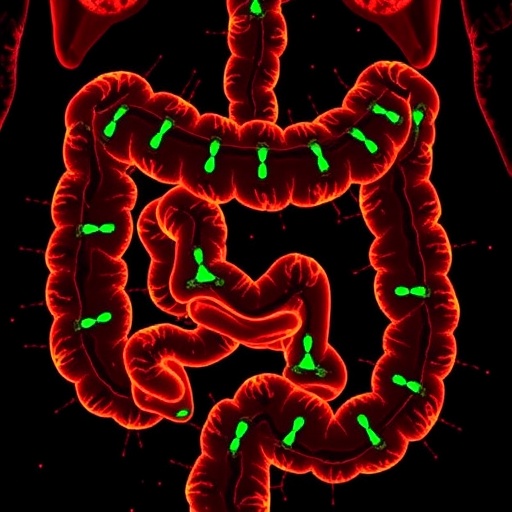Recent studies have spotlighted Cannabidiol (CBD), a prominent cannabinoid derived from the cannabis plant, as a potential therapeutic agent in oncology, particularly with respect to colorectal cancer. The significance of this research is underscored by the alarming incidence of colorectal cancer across the globe, making the discovery of novel anti-cancer strategies imperative. The publication of a recent correction by Feng et al. in the esteemed journal Journal of Cancer Research and Clinical Oncology brings to light crucial findings regarding CBD’s biological effects on cancer cells, specifically its ability to inhibit invasion and metastasis by reversing epithelial-mesenchymal transition (EMT).
The mechanisms underlying colorectal cancer progression are complex, with EMT playing a pivotal role in the invasion and metastasis of cancer cells. EMT is characterized by the loss of epithelial characteristics and the acquisition of migratory and invasive traits, which enable cancer cells to disseminate from the primary tumor. In this study, CBD has been shown to reverse these alterations, thereby hindering the cancerous cells’ ability to invade adjacent tissues and metastasize to distant sites, a phenomenon which is responsible for the majority of cancer-related morbidity and mortality.
Feng et al. meticulously examined the Wnt/β-catenin signaling pathway, a critical pathway that regulates numerous cellular functions, including cell proliferation, migration, and differentiation. Dysregulation of this pathway has been associated with enhanced cancer metastasis. The findings from this research indicate that CBD appears to exert its inhibitory effects on invasion and metastasis through the modulation of the Wnt/β-catenin signaling pathway. The ability to target such a fundamental pathway presents a promising avenue for therapeutic intervention in colorectal cancer.
.adsslot_leHPFVga9O{ width:728px !important; height:90px !important; }
@media (max-width:1199px) { .adsslot_leHPFVga9O{ width:468px !important; height:60px !important; } }
@media (max-width:767px) { .adsslot_leHPFVga9O{ width:320px !important; height:50px !important; } }
ADVERTISEMENT
In their experiments, the researchers assessed the impact of CBD on various colorectal cancer cell lines. By employing in vitro assays, they were able to quantify the invasive potential of the cancer cells in the presence of CBD. The results were striking; those treated with CBD exhibited a marked reduction in invasive capabilities compared to untreated controls. This reduction in invasiveness was coupled with alterations in the expression profiles of key molecular markers that are characteristic of EMT, thus affirming CBD’s role as a potential therapeutic agent.
Furthermore, the researchers provided a comprehensive analysis of the molecular changes induced by CBD treatment. Notably, CBD was found to decrease the levels of mesenchymal markers such as N-cadherin and vimentin, while simultaneously enhancing the expression of epithelial markers, such as E-cadherin. This switch in expression profiles is quintessential for reversing EMT, further accentuating the therapeutic potential of CBD in colorectal cancer treatment strategies.
In addition to its effects on cell migration and invasion, the study delved deeper into the mechanistic interactions between CBD and the Wnt/β-catenin pathway. Through a series of signaling assays, Feng et al. demonstrated that CBD downregulates the activity of β-catenin, an essential component of the Wnt signaling cascade. This downregulation inhibits the transcriptional activity of β-catenin, leading to decreased expression of genes that promote cell proliferation and survival in cancer cells.
The implications of these findings extend beyond basic biology. Understanding how CBD interacts with cellular signaling pathways provides a framework for developing targeted therapies that leverage the compound’s anti-cancer properties without the psychoactive effects associated with other cannabinoids. As researchers continue to explore the nuances of CBD’s pharmacological profile, there is potential for it to be integrated into existing treatment regimens for colorectal cancer, particularly in cases where patients do not respond favorably to conventional therapies.
It is paramount to acknowledge the ethical considerations and the imperative need for rigorous preclinical and clinical trials to validate the safety and efficacy of CBD in cancer treatment. While the results from Feng et al. offer a strong preliminary foundation, translating these findings into clinical practice will require thorough investigation. Future studies must address the pharmacokinetics, optimal dosing, and potential side effects of CBD in cancer therapy.
Moreover, the increasing public interest in cannabinoids for health and wellness reflects a broader trend towards the acceptance of alternative therapeutic modalities. As more patients seek out cannabis-derived products, the importance of clarifying their potential medical applications becomes critical. Misconceptions surrounding cannabis and its derivatives can lead to misinformation, highlighting the necessity for transparency and robust scientific communication in this evolving field.
In conclusion, Feng et al.’s correction outlines essential advancements in our understanding of how CBD can combat colorectal cancer through the modulation of critical biological pathways. The promotion of further research in this realm could catalyze a shift in therapeutic approaches to cancer, providing new hope for patients facing the challenges of metastasis and aggressive disease progression. As ongoing investigations unfurl the intricate dynamics of CBD’s action, they pave the way for innovative strategies that could redefine cancer therapies in the near future.
The pursuit of knowledge in the intertwining of cannabinoids and cancer biology is undoubtedly pressing. With the compelling evidence gathered thus far, there is hope that CBD may soon play a vital role in the therapeutic arsenal against colorectal cancer, functioning as a powerful ally in the fight against one of the most prevalent malignancies worldwide.
Subject of Research: Cannabidiol as a therapeutic agent in colorectal cancer.
Article Title: Correction: Cannabidiol inhibits invasion and metastasis in colorectal cancer cells by reversing epithelial–mesenchymal transition through the Wnt/β-catenin signaling pathway.
Article References:
Feng, P., Zhu, L., Jie, J. et al. Correction: Cannabidiol inhibits invasion and metastasis in colorectal cancer cells by reversing epithelial–mesenchymal transition through the Wnt/β-catenin signaling pathway.
J Cancer Res Clin Oncol 151, 204 (2025). https://doi.org/10.1007/s00432-025-06252-4
Image Credits: AI Generated
DOI: 10.1007/s00432-025-06252-4
Keywords: Cannabidiol, colorectal cancer, invasion, metastasis, epithelial-mesenchymal transition, Wnt/β-catenin signaling pathway.
Tags: anti-cancer strategies for colorectal cancerCannabidiol and colorectal cancercannabidiol in cancer metastasiscannabinoid research in oncologyCBD as a potential cancer therapyCBD therapeutic effects in oncologyCBD’s impact on cancer cell invasioncolorectal cancer incidence and treatmentjournal of cancer research studiesmechanisms of colorectal cancer progressionreversing epithelial-mesenchymal transitionWnt pathway and cancer





